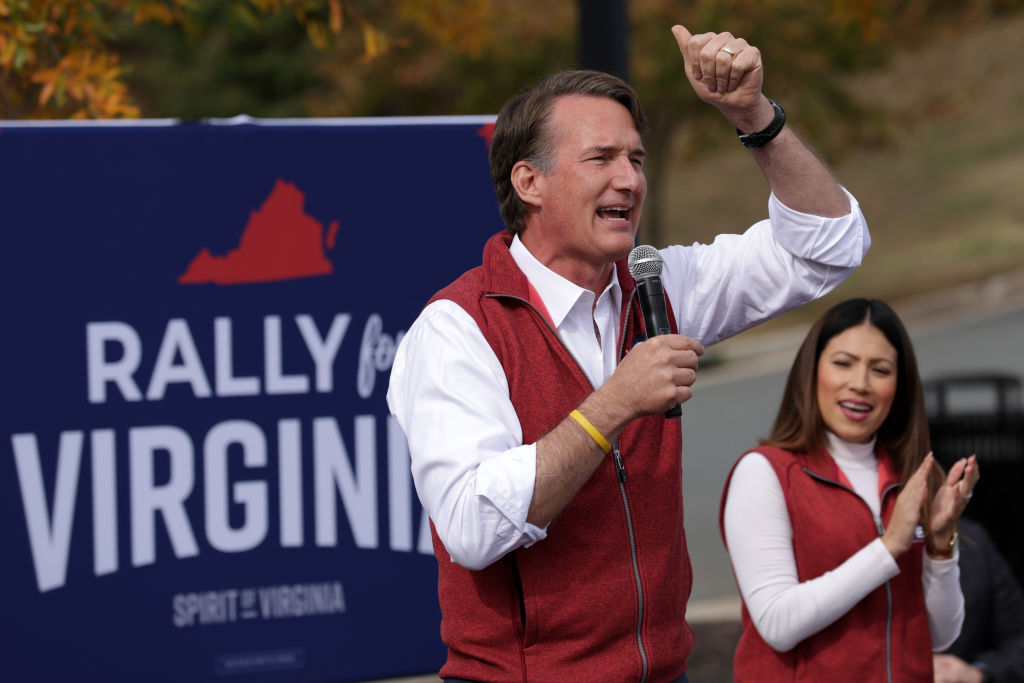PETERSBURG, Virginia—Gov. Glenn Youngkin, first lady Suzanne Youngkin by his side on a late summer afternoon, reads The Story of Ferdinand to a class of eager black and Hispanic third graders inside a bright, cheery public school library in this diverse, working class community 25 miles south of the state capital.
Youngkin tells the kids the classic children’s book is an old favorite as he begins to read the tale of a formidable, seemingly fierce young bull who—contra his peers—has zero interest in bullfighting and resists attempts to prod him into the ring, preferring to lounge under a treasured tree and smell flowers. Perhaps the irony of the story is not lost on the governor. Some wealthy Republican campaign donors, unhappy with the GOP’s White House contenders and dismayed by former President Donald Trump’s domination of the primary, are imploring Youngkin to mount a late bid for the 2024 nomination.
But, as Ferdinand seemed content to stay under his tree, the governor appears exceedingly content to govern in Richmond and rather disinclined to enter the national political ring. Not that Youngkin is oblivious to the benefits his celebrity affords in megadonor circles. By leaving the door cracked open to a presidential campaign, the governor is leveraging his status as a potential white knight to raise gobs of campaign cash. He’s investing that money in a sophisticated operation aimed at capturing full control of the Virginia General Assembly this November.
“I’ve been incredibly relieved and also encouraged by the support for what we’re doing, that folks have seen that with common sense conservative principles and governing, you can move at an amazing pace, you can accomplish real results that impact people every single day,” Youngkin tells reporters here in Petersburg, responding to a question from The Dispatch after the event at Pleasants Lane Elementary School. He was there to promote a tutoring program he wants to make available to all Virginia public school students.
“It’s important,” the governor adds, underscoring the significance of the financial support he’s receiving from Republican donors outside of Virginia. He’s not wrong. Candidate versus candidate across all legislative races, Democrats in Virginia outraised Republicans $15 million to $10.6 million in July and August, according to the Washington Post.
Youngkin won the governor’s mansion in November 2021 by 2 percentage points, one year after Joe Biden earned 54.1 percent of Virginia’s votes to Donald Trump’s 44 percent. Youngkin’s victory in otherwise perennially blue Virginia had coattails, sweeping the Republican candidates for attorney general and lieutenant governor to victory, and putting the GOP back in charge of the House of Delegates. Now, the governor wants to finish the job by ousting Democrats from control of the state Senate. Republicans need to flip four seats to do so.
To pull off the effort, Youngkin has built the sort of extensive political infrastructure typically fielded by the congressional campaign committees. A team of veteran consultants assists with campaign messaging, strategy, and fundraising. Ads run on television and other platforms. The operation has mounted a coordinated voter turnout program featuring more than 100 people to knock on doors, man phone banks, text voters, and chat on social media. And, of course, there is the governor.
His fundraising is providing crucial financing. Youngkin raised $12 million from March through August 31, including $3.3 million last month. He is traveling the commonwealth to campaign for Republican candidates, whom he consults with personally on a regular basis, and he is intimately involved in directing the granular details of his team’s decision-making. It’s no surprise Virginia Republicans have nothing but praise for him. But the way they’re expressing that praise is worth noting.
“The governor’s leadership style is very respectful. It’s engaging,” says Siobhan Dunnavant, an incumbent Republican state senator up for reelection this fall. “He’s not running all of these campaigns. He’s enabling and supporting and setting guidelines for what the campaigns should be doing and then letting them do it. That’s a wonderful kind of leadership.”
“I don’t like running for reelection, I prefer legislating,” adds Dunnavant, who works by day as an obstetrician/gynecologist. “But this has been almost fun.”
On the surface Youngkin, a 56-year-old career private equity executive who had never sought public office before running for governor, fits the part of the political outsider so popular now in Republican politics. But those working with him indicate he’s a genuine, old-school party builder, something not necessarily fashionable in the GOP lately. “I think he feels responsible for the future of our party,” says Republican C. Todd Gilbert, speaker of the House of Delegates.
Trailing Youngkin around Virginia for a couple of days in mid-September, there is a presidential-level quality to the events he headlines.
In Leesburg, a tony Washington exurb, the governor hosts a town hall meeting inside a sparkling new church auditorium. Youngkin, there to boost state Senate candidate Juan Pablo Segura, is flanked by red, white, and blue banners that read “Parents Matter” and are dotted with miniature map outlines of Virginia and the governor’s last name. An audience of approximately 500 claps and waves “Youngkin 74” placards (he is the commonwealth’s 74th governor) while waiting for aides to hustle over with hand-held microphones so they can query and comment about public education.
The next day in Petersburg, a community of more than 33,000 that U.S. census records say is 76.6 percent black and 5.1 percent Hispanic, Youngkin and his wife personally, and separately, greet teachers, administrators, and students as they enter Pleasants Lane Elementary School.
Once inside the school’s library, the Youngkins crouch down to have individual conversations with each of the 20 third graders present. They ask the children about their favorite subjects, talk with them about books they like to read, and confirm more than once to kids who ask that, as Youngkin tells one youngster: “I’m the governor, yes I am. I work for you.” Almost every interaction ends with a hug, and the students seem delighted to have met such prominent people.
All the while, a throng of reporters and television news cameras capture the scene, one that any Democratic or Republican presidential contender—especially a Republican—would covet. Yet Youngkin’s priorities could not be further from White House politics. Both events, representative of the campaigning he has engaged in for GOP legislative candidates across the commonwealth, are focused on state and local issues, with a heavy emphasis on education reform, the issue that fueled his upset victory two years ago.
Missing is almost any trace of the buzzwords and politically charged issues common at Republican campaign events in Iowa, New Hampshire, and South Carolina. Almost. Youngkin does volunteer during the campaign event in Leesburg that he opposes biological males participating in girls’ sports. And when pressed by The Dispatch during a short news conference with reporters afterward, the governor acknowledges that limiting abortion rights is among his priorities should Republicans flip the Virginia Senate and hold the House of Delegates.
But Youngkin had to be pressed on it after failing to raise the topic while answering the initial question about what he would do with a Republican General Assembly. “Okay, so that was your real question,” Youngkin responds combatively but with a smile when asked if plans to seek legislation limiting abortion rights at 15 weeks of pregnancy are still on his to-do list. The answer is “yes,” and the next day in Petersburg, Youngkin discusses abortion unprompted while addressing a similar question.
“There’s a moment for us to come together on one of the toughest items, which is abortion,” Youngkin says when asked about the urgency of ejecting Democrats from power in Richmond given the long list of accomplishments he cites as having occurred with their cooperation and participation since he assumed office in early 2022. “I have been very clear, Virginians elected a pro-life governor. I do believe in exceptions in the case of rape and incest, when a mother’s life is at risk.”
The governor, an unabashed social conservative, says he supports legislation that “protects life” once “a baby feels pain” and expresses confidence Virginians can find consensus on an issue he acknowledges is among “the most divisive that we see.”
Prominent Democratic leaders focused on the Virginia legislative elections believe Youngkin’s position on abortion is key to defending the state Senate—and puncturing his popularity. In a fresh poll from the Virginia-based nonpartisan political nonprofit organization Founders Insight, 58 percent of likely voters approved of Youngkin’s job performance, a rating that jumped to 65 percent among independents. “Governor Glenn Youngkin and the extreme Republicans have made it clear that they’re trying to take us back on issues like choice,” Biden said recently during a fundraiser in McLean, a wealthy suburb just across the Potomac River from Washington, per a White House transcript. (In the same survey, President Joe Biden’s job approval was 44 percent—45 percent among independents.)
“Voters in Virginia know that abortion is on the ballot this November,” Rep. Jennifer McClellan, a Democrat whose congressional district is anchored in Richmond, added in a conference call with reporters.
A politician like Youngkin peering around the corner at a national campaign might use such attacks to toss red meat to grassroots Republicans in the key early primary states. But Youngkin has done the opposite. Contrast that with the governor’s actions last year. In 2022, as Republicans across the country campaigned for Congress and governor’s mansions in battleground states, Youngkin was there to stump for them, testing his appetite for national politics—and the appeal of his brand of traditional, sunny conservatism in a GOP that seems enthralled with provocative populists.
That Youngkin is guiding a campaign for control of the Virginia legislature that in tone, tenor, rhetoric, and issue-set appears—with the exception of abortion—tailored to helping Republicans gain more power in a decidedly Democratic state, also signals his lack of interest in running for president.
But if that’s not enough, there’s also this: Youngkin is famously data-driven, an approach that made him a multimillionaire many times over in business and has helped him succeed in politics. The governor can read a poll as well as anyone, and with Trump leading competitors for the Republican nomination with 56.6 percent in the RealClearPolitics average, there’s no indication Republican primary voters are longing for Youngkin.
Yet the governor continues to play coy.
The just-unveiled deadline to file for the 2024 New Hampshire primary is October 27. That’s roughly 10 days before the Virginia legislative elections, the day after which Youngkin has long said he would (finally) turn his attention to political matters outside of the Old Dominion. Is Youngkin, a native Virginian who relishes governing, going to work this hard to consolidate power in the commonwealth only to deny himself the fruits of his labor and undercut his newly earned political capital by jumping on a plane for Iowa and New Hampshire the next day?
His political spokesman, Zack Roday, declined to comment Monday when asked how the governor would handle the sequence of events.
Top Republicans in Richmond say they aren’t sure what the governor is going to do. “I can’t get into his head and tell you what he may or may not be thinking about that. But I can certainly see it,” Gilbert says. “I’m not surprised that his name keeps getting bandied about.”









Please note that we at The Dispatch hold ourselves, our work, and our commenters to a higher standard than other places on the internet. We welcome comments that foster genuine debate or discussion—including comments critical of us or our work—but responses that include ad hominem attacks on fellow Dispatch members or are intended to stoke fear and anger may be moderated.